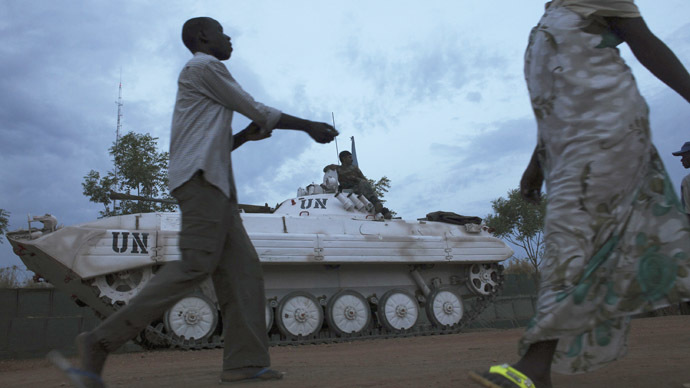Gunmen posing as peaceful protesters forced their way inside the base of the UN mission in Bor, where some 5,000 civilians are seeking protection in the four-month-long conflict, and opened fire, reportedly killing dozens.
At least 48 people were killed and 60 wounded in a brazen attack
on the fortified UN compound in northern Jonglei state, where
Indian and South Korean UN peacekeepers are stationed, an
anonymous UN source told Reuters.
Toby Lanzer, the UN's top aid official in South Sudan, told the
BBC there was a “significant loss of life,” after a mob
had approached the UN compound base on Thursday morning under the
pretense of wanting to present a petition.
More than 1 million people have fled their homes since violence
broke out in mid-December between federal troops loyal to
President Salva Kiir against rebellious troops who have sided
with Riek Machar, the former vice-president, in 2013.
Tens of thousands of civilians are seeking UN protection from the
conflict.
UN spokesman Stephane Dujarric said the attack on innocent
civilians and UN personnel marks “serious escalation.”
According to Dujarric, the attack was planned in advance.
"The assailants - a mob of armed civilians - came to the base
under the guise of peaceful demonstrators intending to present a
petition to UNMISS [the UN peacekeeping mission]."
"The armed mob forced entry on to the site and opened fire on
the internally displaced persons sheltering inside the
base," he said. "At the time of the attack there were
some 5,000 displaced civilians ... inside the base."
The injured were being treated at the UN compound’s clinic.
The number of displaced civilians in the UNMISS compound has
risen to 12,000, according to the UN’s website, adding that
thousands of displaced persons assembled near the Bentiu Hospital
and the UN World Food Program (WFP) compound.
UN Secretary-General Ban Ki-moon, who just one day before the
attack said that up to 1 million people face potential famine as
a result of the conflict, condemned the attack, which he said
“constitutes a war crime.”
Despite South Sudan gaining its independence from Sudan in 2011,
pockets of violence continues to disrupt parts of the landlocked
country in northeastern Africa.
At the same time, the instability has put a dent in oil
production, a major source of the government’s funds.


